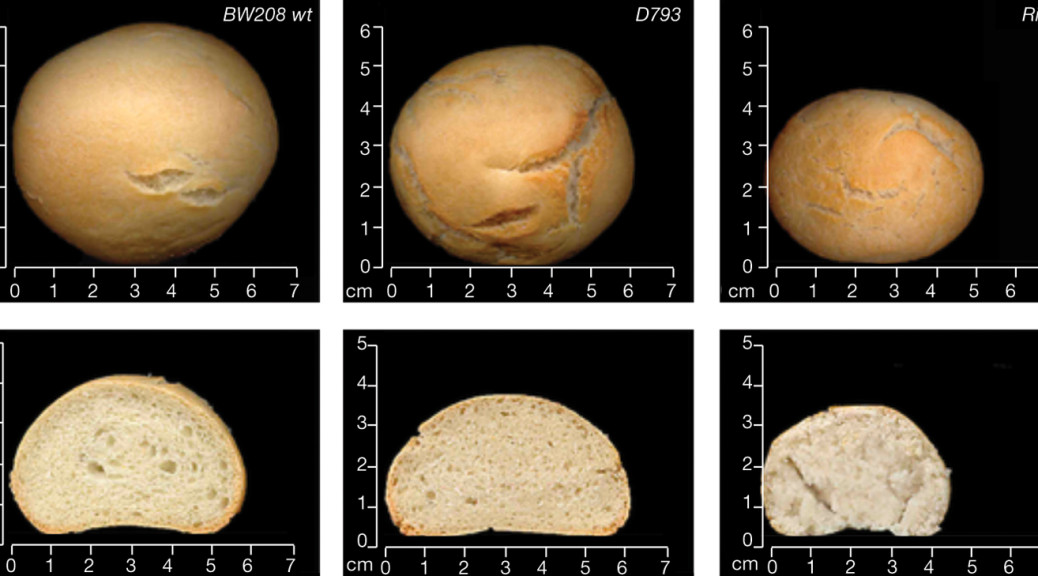Two German plant breeders this April released newly developed tomato and wheat varieties under open-source licenses. The breeders, Göttingen University’s Bernd Horneburg and his team, and Dottenfelderhof researcher Hartmut Spieß, issued the licenses to encourage other scientists and breeders to experiment and improve these plants varieties under a legal framework. Under the OpenSourceSeed initiative, agricultural scientists can access open-source seeds, by paying a small fee to cover maintenance breeding and delivery costs. They are then allowed to “use the seeds in multiple ways,” according to the open-source license. But should users develop subsequent varieties, they are not allowed to issue patents on them, and instead must agree to release them under the original open-source license. Continue reading Plant breeders test drive first open-source seed bank
Category Archives: Nature Biotechnology
Will Europe toast GM wheat for gluten sufferers?
Soon, individuals with celiac disease in southern Spain will begin receiving regular allotments of bread. Rather than misguided charity, this will be a clinical trial of a new type of dough made from genetically modified (GM) wheat. The wheat has been altered to be low in gliadins—the portion of gluten proteins that are toxic to people with celiac disease. If successful, the trial could bolster growing research efforts to engineer wheat to be compatible with the immune systems of the ~1% of the global population with celiac disease and the much larger number of people with gluten allergies.
Low-gluten wheat could also open a new front in the battle for GM food acceptability in Europe. If Europeans are ever going to accept a GM food, celiac-safe wheat may be a good candidate. European consumers accounted for over  1.1 ($1.21) billion of nearly
1.1 ($1.21) billion of nearly  1.9 billion worldwide gluten-free food market, according to market research firm Euromonitor International. Global gluten-free bakery sales are expected to grow at >7% annually, the firm predicts. But because this and other efforts to modify wheat involve inserting genetic elements to silence genes, they are subject to a European regulatory process closely tied to anti-GM politics. And even if such legal barriers to marketing are overcome, marketing such a wheat would require not just farmers, but millers, bakers and consumers to be persuaded that it is worthwhile. Continue reading Will Europe toast GM wheat for gluten sufferers?
1.9 billion worldwide gluten-free food market, according to market research firm Euromonitor International. Global gluten-free bakery sales are expected to grow at >7% annually, the firm predicts. But because this and other efforts to modify wheat involve inserting genetic elements to silence genes, they are subject to a European regulatory process closely tied to anti-GM politics. And even if such legal barriers to marketing are overcome, marketing such a wheat would require not just farmers, but millers, bakers and consumers to be persuaded that it is worthwhile. Continue reading Will Europe toast GM wheat for gluten sufferers?
IBM debuts hyped ‘cognitive cloud’ biotech HQ in Cambridge
In September IBM announced deals with Teva Pharma and Sage Bionetworks to use its Watson Health Cloud platform for a range of services, from selecting molecules for drug development to planning clinical trials and advising clinicians. A couple of weeks later, Microsoft, in Redmond, Washington, revealed a partnership between its Azure cloud computing platform and the University of California Santa Cruz (UCSC) Genomics Institute for data storage and analysis to support its work on genomics research. Information technology firms large and small are expanding their ecosystem of cloud computing facilities and services, hoping to attract players in industry and academia. Cloud systems can ferry, store and combine clinical, research, social and health data. Companies are attracted to these services because they allow them to keep up with the constantly growing pool of information without having to invest in their own information technology infrastructure.
Read the rest of this news story in the December 2015 issue of Nature Biotechnology: [html].
DARPA redesign
 The US Defense Advanced Research Projects Agency (DARPA) opened a new office in April uniting its biology, and related engineering and computer science research. The Biological Technologies Office (BTO), directed by neurologist and retired Army colonel Geoffrey Ling, inherited 23 existing research programs and on April 24 launched its first new one, involving prosthetics. Other areas of research include diagnostics for infectious diseases, synthetic biology, biological clocks, systems biology and a program to establish the lineage of genetic modifications to living organisms. The office’s 2015 budget is around $250 million. Continue reading DARPA redesign
The US Defense Advanced Research Projects Agency (DARPA) opened a new office in April uniting its biology, and related engineering and computer science research. The Biological Technologies Office (BTO), directed by neurologist and retired Army colonel Geoffrey Ling, inherited 23 existing research programs and on April 24 launched its first new one, involving prosthetics. Other areas of research include diagnostics for infectious diseases, synthetic biology, biological clocks, systems biology and a program to establish the lineage of genetic modifications to living organisms. The office’s 2015 budget is around $250 million. Continue reading DARPA redesign
